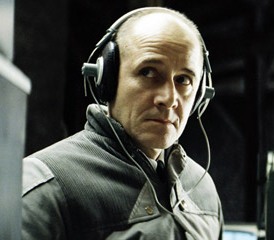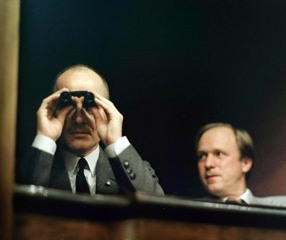 In David Fincher’s Zodiac, well-intentioned cops from different jurisdictions conduct archival sleuthing and the occasional phone trace to track down a cold-blooded killer. But, in Florian Henckel von Donnersmarck’s powerful, humanistic The Lives of Others, the second half of my double-feature last Friday, the bureaucratic machinery of the State grinds into gear for a darker purpose. Here, in the final flower of Erich Honecker’s East Germany, the Stasi keep their eyes and ears on those who would threaten the integrity of the German Democratic Republic, which, sadly, counts as just about everyone. I know very little about this subject, so I can’t vouch for how well van Donnersmarck recreates the rigors of East German life in the 1980s. Still, as an Orwellian parable of secrets and surveillance, The Lives of Others is a very worthwhile film, one strong enough to overcome some perhaps overly cliched moments of awakening by various characters along the way.
In David Fincher’s Zodiac, well-intentioned cops from different jurisdictions conduct archival sleuthing and the occasional phone trace to track down a cold-blooded killer. But, in Florian Henckel von Donnersmarck’s powerful, humanistic The Lives of Others, the second half of my double-feature last Friday, the bureaucratic machinery of the State grinds into gear for a darker purpose. Here, in the final flower of Erich Honecker’s East Germany, the Stasi keep their eyes and ears on those who would threaten the integrity of the German Democratic Republic, which, sadly, counts as just about everyone. I know very little about this subject, so I can’t vouch for how well van Donnersmarck recreates the rigors of East German life in the 1980s. Still, as an Orwellian parable of secrets and surveillance, The Lives of Others is a very worthwhile film, one strong enough to overcome some perhaps overly cliched moments of awakening by various characters along the way.
When we first meet Capt. Gerd Wiesler (Ulrich Muhe), with his sleek dome, thin ties, and retrofuturistic jacket, he’s training young Stasi cadets in the subtler techniques of interrogation and threatening landladies with the ruin of their children’s future — clearly a right rotten bastard of the first order. Still, there’s something undeniably impressive about the ever watchful Wiesler, a man who’s both cognizant of even the slightest emotional shifts in his prey and committed fully to the ideological aspirations of the Party. Wiesler’s skill and fervor is not lost on party flunky Anton Grubitz (Ulrich Tukur), who assigns him to a career-making case of digging up dirt on the roguishly handsome, go-along-to-get-along playwright Georg Dreyman (Sebastian Koch) for a well-connected romantic rival.
But, something — perhaps the sight of Dreyman’s beautiful actress girlfriend Christa-Maria Sieland (Martina Gedeck) on stage, perhaps something else — clicks in Wiesler as he conducts his round-the-clock surveillance. And, from the dismal attic above Dreyman’s apartment, Capt. Wiesler soon begins, despite himself, to commit Thoughtcrime. And as Dreyman begins to associate with known subversives and the investigatory noose tightens, Wiesler finds himself increasingly complicit in the machinations of the artists downstairs, so much so that he soon, if he’s not very, very careful, runs the risk of being the Stasi’s next target.
I can see the criticism that The Lives of Others can occasionally be a bit too pat. The distinctions between Wiesler and Dreyman are perhaps a bit overdrawn (Dreyman’s apartment is always suffused with a warm glow, and he and Sieland are invariably surrounded by friends, music, and the finer things in life; meanwhile, Wiesler scurries about the cold, gray machines upstairs, and basically lives like Eleanor Rigby — get a dog, Captain), and there are definitely a few cliche-ridden scenes along the way (for example, one involving the instantly transformative power of Beethoven — you’ll know what i mean.
 Still, The Lives of Others is affecting in the details: Dreyman (“Lazlo”) and Sieland (“CMS”) are reduced to abstractions by the Stasi’s surveillance regime, with all the messy, conflicted, and emotion-ridden qualities that make them human drained away. (“They presumably have intercourse,” comments Wiesler dryly in his report after one tender moment.) Conversely, Wiesler’s attempts to break free of his own self-imposed leash and sound even the feeblest of barbaric yawps are moving in their own way, be it his sneaking out a dog-eared copy of Brecht from Dreyman’s shelf or renegotiating his interrogation strategy on an eight-year-old in his elevator.
Still, The Lives of Others is affecting in the details: Dreyman (“Lazlo”) and Sieland (“CMS”) are reduced to abstractions by the Stasi’s surveillance regime, with all the messy, conflicted, and emotion-ridden qualities that make them human drained away. (“They presumably have intercourse,” comments Wiesler dryly in his report after one tender moment.) Conversely, Wiesler’s attempts to break free of his own self-imposed leash and sound even the feeblest of barbaric yawps are moving in their own way, be it his sneaking out a dog-eared copy of Brecht from Dreyman’s shelf or renegotiating his interrogation strategy on an eight-year-old in his elevator.
The Lives of Others ends with a coda that at first seems too long but ultimately sounds just the right note: As Auden memorably put it, There is no such thing as the State, and no one exists alone; Hunger allows no choice to the citizen or the police; We must love one another or die. May I, composed like them of Eros and of dust, beleaguered by the same negation and despair, show an affirming flame.

I actually thought the movie was worse off for the last 30 minutes. My father has a great saying about painting legs on a snake. The snake is perfectly fine (in this case, moving, beautiful, heartbreaking) and then you go and paint some legs on it and ruins the whole thing.
Perhaps my analogy is a little too folksy, but I think I’ve made my point. But what do I know? The cliched, overwrought moment involving the transformative power of Beethoven made me cry. My face was mirroring Wiesler’s.
I really, really liked this. I had no idea what it was going to be about (I’m living in a bubble these days), but thought the story worked. It also nudged the history nerd inside me, so I guess I’ll be reading about East Germany for a few weeks.
*spoiler*
There were def. cliched moments (for me the one that stood out was the suicide, which was etched on the wall as soon as the character was introduced), but overall I found the film clever and affecting.
I really like the Auden quotation, at least…
rohan: yes, that’s one major potential prleobm with the film but I think the film manages to avoid this by focussing on one individual story and also because of the very sensitive performance by Muhe. Even in the beginning of the film you can already see in his haunted look that he is not really “at home” there in the Stasi organization and that’s why when the change of heart comes it doesn’t feel like a surprise or even remotely manipulative. The film also avoids those cliched messages about redemption or triumph of human spirit or how love wins against odds etc etc. I really don’t think it asks to be seen a portrait of a “typical” Stasi man. As a German Florian HD must be aware of the prleobms and ironies of this sentimental view of arts… After all, most nazis were music-buffs and germany was one the most culturally advanced nations on earth.In the last section of the film Schindler’s List actually does all these things, that’s why even if it was based on a true story, the film (or at least its intended “message”) feels false, dishonest and manipulative. The film overall is still remarkable for its craft but there again as in the notorious “shower” scene Spielberg seems to forget that he is making a film about holocaust and not one of his regular blockbuster-thrillers…though thankfully those moments are very few.